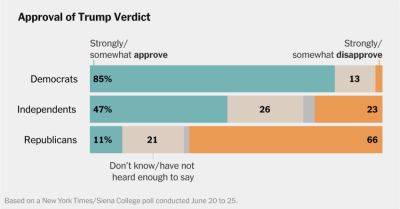Behind the Republican Effort to Win Over Black Men
Two Black Republican House members and Trump surrogates reserved a cigar bar near downtown Philadelphia last week and invited conservative organizers and Trump-curious Black voters to smoke and sip cognac.
Some Democrats denounced it as a crass play, rooted in stereotype. But the event was geared toward a demographic that Republicans — and especially former President Donald J. Trump’s campaign — see as one they can cut into just enough to win in November: Black men.
Republicans, pointing to recent polls that show Black voters’ support for Democrats softening, are making a push to win the votes of Black men, an important part of the Democratic base that has shown openness to voting for Mr. Trump.
The effort has led to a series of awkward — and what some say are offensive — episodes of political theater. Mr. Trump has marketed gold sneakers to young men of color. He has suggested that his conviction on felony charges makes him more relatable to Black voters. And he has campaigned with rappers facing charges of gang murder and weapons possession.
Mr. Trump’s allies say that his critics are missing the point: The Republican Party, which was nearly 60 percent white as recently as 2022, according to exit polls, isn’t trying to appeal to every Black voter. It needs just enough Black support to undermine President Biden’s bedrock coalition.







